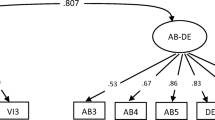Abstract
This study aims to analyze the psychometric properties of the Italian translation of the short form of the Utrecht Work Engagement Scale—Student version (UWES-S-9) on a sample of 491 Italian University students aged between 18 and 47 years (M = 24.24 ± 4.64; 24% boys and 76% girls). We analyzed the factor structure of the UWES-S-9 by means of four Confirmatory Factor Analyses. Moreover, we examined if there were some demographic and study-related (year and area of study) differences in study engagement, using a path analysis model. Finally, we analyzed the correlations between study engagement and both academic performance (Grade Point Average) and time spent studying (hours of study per day generally and before exams). We found that the Italian UWES-S-9 has good psychometric properties. Moreover, students of Scientific and Biomedical majors are more dedicated to studying as compared to Humanities and Professional Health Sciences students.


Similar content being viewed by others
References
Balducci, C., Fraccaroli, F., & Schaufeli, W. (2010). Psychometric properties of the Italian version of the Utrecht Work Engagement Scale (UWES-9). A cross-cultural analysis. European Journal of Psychological Assessment, 26(2), 143–149.
Byrne, B. M. (2001). Structural equation modeling with AMOS: Basic concepts, applications, and programming. Mahwah, NJ: Lawrence Erlbaum Associates.
Cadime, I., Lima, S., Pinto, A. M., & Ribeiro, I. (2016). Measurement invariance of the Utrecht Work Engagement Scale for Students: A study across secondary school pupils and university students. European Journal of Developmental Psychology, 13(2), 254–264.
Cohen, J. (1988). Statistical power analysis for the behavioral sciences (2nd ed.). Hillsdale, NJ: Lawrence Erlbaum Associates.
Durán, A., Extremera, N., & Rey, L. (2004). Engagement and burnout: Analyzing their association patterns. Psychological Reports, 94, 1048–1050.
Hu, L., & Bentler, P. M. (1999). Cutoff criteria for fit indexes in covariance structure analysis: Conventional criteria versus new alternatives. Structural Equation Modeling: A Multidisciplinary Journal, 6(1), 1–55.
Loscalzo, Y., & Giannini, M. (2017). Studyholism or Study Addiction? A comprehensive model for a possible new clinical condition. In A. M. Columbus (Ed.), Advances in psychological research (pp. 19–37). New York: Nova Publisher.
Mayedu-Olivares, A., Coffman, D. L., & Hartmann, W. M. (2007). Asymptotically distribution-free (ADF) interval estimation of coefficient alpha. Psychological Methods, 12(2), 157–176.
Meng, L., & Jin, Y. (2017). A confirmatory factor analysis of the Utrecht Work Engagement Scale for students in a Chinese sample. Nurse Education Today, 49, 129–134.
Mills, M. J., Culberston, S. S., & Fullagar, C. J. J. (2012). Conceptualizing and measuring engagement: An analysis of the Utrecht Work Engagement Scale. Journal of Happiness Studies, 13(3), 519–545.
Reeve, B. B., Hays, R. D., Bjorner, J. K., Cook, K. F., Crane, P. K., Teresi, J. A., et al. (2007). Psychometric evaluation and calibration of health related quality of life item banks: Plans for the patient-reported outcomes measurement information system (PROMIS). Medical Care, 45(5), S22–S31.
Rhemtulla, M., Brosseau-Liard, P. É., & Savalei, V. (2012). When can categorical variables be treated as continuous? A comparison of robust continuous and categorical SEM estimation methods under suboptimal conditions. Psychological Methods, 17(3), 354–373.
Römer, J. (2016). The Korean Utrecht Work Engagement Scale-Student (UWES-S): A factor validation study. TPM-Testing, Psychometrics, Methodology in Applied Psychology, 23(1), 65–82.
Salanova, M., Llorens, S., Cifre, E., Martinez, I. M., & Schaufeli, W. B. (2003). Perceived collective efficacy, subjective well-being, and task performance among electronic work group: An experimental study. Small Group Research, 34, 43–73.
Salanova, M., Schaufeli, W. B., Martinez, I. M., & Breso, E. (2010). How obstacles and facilitators predict academic performance: The mediating role of study burnout and engagement. Anxiety Stress and Coping, 23, 53–70.
Schaufeli, W. B., & Bakker, A. B. (2004). Test manual for the Utrecht Work Engagement Scale. Unpublished manuscript, Utrecht University, The Netherlands.
Schaufeli, W. B., Bakker, A. B., & Salanova, M. (2006). The measurement of work engagement with a short questionnaire. Educational and Psychological Measurement, 66, 701–716.
Schaufeli, W. B., Martínez, I. M., Pinto, A. M., Salanova, M., & Bakker, A. B. (2002a). Burnout and engagement in University students. A cross-national study. Journal of Cross-Cultural Psychology, 33(5), 464–481.
Schaufeli, W. B., Salanova, M., González-Romá, V., & Bakker, A. B. (2002b). The measurement of engagement and burnout: A two sample confirmatory factor analytic approach. Journal of Happiness Studies, 3, 71–92.
Seligman, M. E. P., & Csikszentmihalyi, M. (2000). Positive psychology: An introduction. American Psychologist, 55, 5–14.
Author information
Authors and Affiliations
Corresponding author
Ethics declarations
Conflict of interest
The authors declare that they have no conflict of interest.
Ethical Approval
All procedures performed in studies involving human participants were in accordance with the ethical standards of the institutional and/or national research committee and with the 1964 Helsinki declaration and its later amendments or comparable ethical standards.
Informed Consent
Informed consent was obtained from all individual participants included in the study.
Rights and permissions
About this article
Cite this article
Loscalzo, Y., Giannini, M. Study Engagement in Italian University Students: A Confirmatory Factor Analysis of the Utrecht Work Engagement Scale—Student Version. Soc Indic Res 142, 845–854 (2019). https://doi.org/10.1007/s11205-018-1943-y
Accepted:
Published:
Issue Date:
DOI: https://doi.org/10.1007/s11205-018-1943-y



